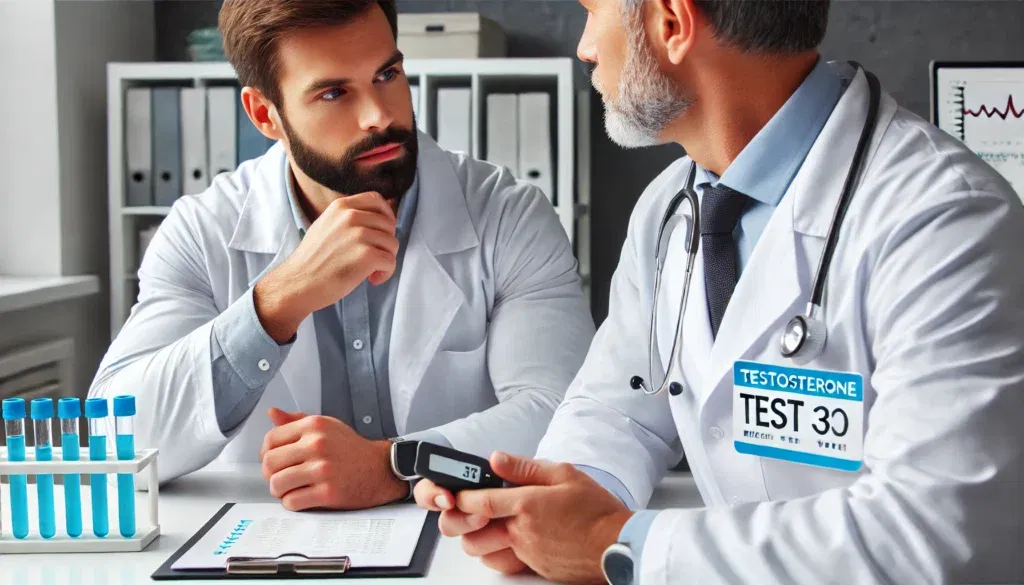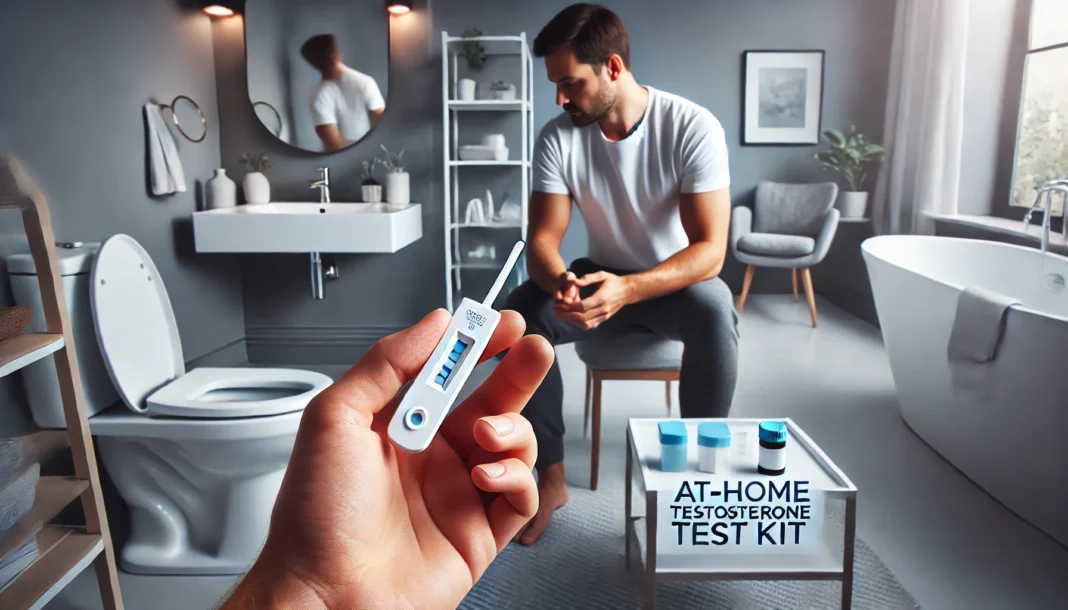Testosterone plays a crucial role in men’s health, influencing everything from muscle mass and bone density to mood and sexual function. If you suspect your testosterone levels may be imbalanced, getting tested is the first step toward understanding your hormonal health. Whether you’re experiencing symptoms like fatigue, low libido, or mood swings, or simply want to monitor your levels as part of a proactive health plan, there are several reliable ways to check your testosterone. This guide explores the best at-home and lab testing options, covering everything from cost considerations to test accuracy and what to expect from your results.
You may also like: How to Increase Testosterone Levels Naturally: Science-Backed Strategies for Men’s Health & Longevity
Why Testosterone Testing Matters
Understanding your testosterone levels is essential for maintaining overall health and well-being. Testosterone is the primary male sex hormone, but it also plays significant roles in women’s health. Low testosterone, or hypogonadism, can lead to various health issues, including reduced muscle mass, increased body fat, osteoporosis, and depression. On the other hand, excessively high levels can contribute to aggressive behavior, acne, and an increased risk of cardiovascular problems. Testing your testosterone levels allows you to assess whether they fall within the normal range and take appropriate action if needed.
Hormonal imbalances are more common than many people realize. Lifestyle factors such as poor diet, lack of exercise, chronic stress, and inadequate sleep can negatively impact testosterone production. Additionally, medical conditions such as diabetes, obesity, and certain genetic disorders can contribute to low testosterone. By getting tested, you gain valuable insight into your hormonal health and can make informed decisions about lifestyle changes or medical interventions.

How to Get Your Testosterone Levels Checked
There are several ways to test your testosterone levels, ranging from traditional lab tests to convenient at-home kits. The right option for you depends on factors such as accessibility, cost, and whether you prefer professional oversight. The two primary methods for testosterone testing are blood tests and saliva tests. Blood tests, often conducted in a laboratory setting, are considered the gold standard for accuracy. Saliva tests, while convenient for at-home use, may have limitations in terms of precision and reliability.
If you’re wondering where to get testosterone tested, many options are available. You can visit a doctor’s office, a specialized hormone clinic, or a commercial lab testing center. Additionally, numerous online platforms allow you to order testosterone blood work without needing a physician’s referral. These services provide flexibility for individuals who prefer to check testosterone levels at home or want to explore their options independently.
At-Home Testosterone Testing: Convenience and Accessibility
At-home testosterone test kits offer a convenient way to check hormone levels without visiting a doctor or laboratory. These kits typically require either a saliva sample or a small blood sample obtained through a finger prick. Once collected, the sample is sent to a certified laboratory for analysis. Results are usually available within a few days and are often accompanied by a detailed report explaining your testosterone levels and what they mean.
Many people opt for at-home testosterone tests due to their privacy and ease of use. They are particularly beneficial for those who prefer not to visit a clinic or want to monitor their hormone levels regularly. However, it’s important to choose a reputable testing provider to ensure accurate and reliable results. Some of the best at-home testosterone test kits come from well-established companies that partner with accredited laboratories.
Despite their convenience, at-home tests may have some drawbacks. Factors such as sample contamination, improper collection, or variations in saliva hormone levels throughout the day can affect accuracy. For individuals with suspected hormonal imbalances or underlying health conditions, a laboratory-based blood test may be a better option.
Laboratory Testosterone Testing: Accuracy and Medical Oversight
For those who prefer a more comprehensive and clinically supervised approach, laboratory testosterone testing is the most reliable method. Blood tests performed in a medical setting measure total testosterone, free testosterone, and sometimes additional hormone markers like sex hormone-binding globulin (SHBG) and luteinizing hormone (LH). These additional markers provide a more detailed picture of hormonal health and help healthcare providers identify potential underlying causes of imbalance.
If you’re wondering where to get a testosterone test done, options include hospitals, private clinics, and independent lab testing centers. Many commercial laboratories allow individuals to order testosterone blood work directly, eliminating the need for a doctor’s referral. These facilities often provide same-day or next-day appointments, making it easy to schedule a test at your convenience.
One common question is whether fasting is necessary for a testosterone blood test. In most cases, fasting is not required. However, since testosterone levels fluctuate throughout the day, doctors typically recommend testing in the morning when levels are highest. If you’re taking medications or supplements that could influence your results, it’s best to consult with a healthcare provider before scheduling the test.
Testosterone Test Pricing: How Much Does It Cost?
The cost of testosterone testing varies depending on the method chosen and the provider. At-home testosterone test kits generally range from $50 to $150, depending on the company and the comprehensiveness of the analysis. These tests typically include laboratory fees and result interpretation.
For laboratory testing, prices can vary significantly. A standard testosterone blood test at a commercial lab typically costs between $40 and $100. If additional hormone markers are included, such as SHBG or LH, the price can increase to $150 or more. Health insurance may cover testosterone testing if deemed medically necessary, but coverage varies based on the provider and plan.
Online lab test providers offer a convenient way to order testosterone testing without a doctor’s visit. Many services allow you to purchase a testosterone test online, visit a partnered lab for sample collection, and receive digital results within a few days. These options are particularly useful for those who want quick access to their health data without waiting for a doctor’s appointment.
Interpreting Your Testosterone Test Results
Understanding your test results is crucial for making informed decisions about your health. Normal testosterone levels vary based on factors such as age, sex, and health status. For men, total testosterone levels typically range between 300 and 1,000 ng/dL. Free testosterone, which represents the active form of the hormone, usually falls between 4.5 and 21.5 pg/mL.
If your results indicate low testosterone, lifestyle changes such as improving diet, increasing exercise, reducing stress, and prioritizing sleep can help support natural hormone production. In cases where low levels persist, hormone replacement therapy (HRT) or other medical interventions may be necessary. Conversely, if testosterone levels are abnormally high, it may be due to anabolic steroid use, certain medical conditions, or adrenal gland disorders.

Frequently Asked Questions (FAQ) on Testosterone Testing
1. How can I check my testosterone levels at home?
Checking your testosterone levels at home is possible using an at-home testosterone test kit. These kits typically require a saliva or blood sample, which is then sent to a certified laboratory for analysis. While at-home tests provide a convenient way to check testosterone levels, they may not always be as accurate as lab-based blood tests. If you suspect a hormonal imbalance, it is best to follow up with a healthcare provider for confirmation and further evaluation. Combining an at-home testosterone test with professional testing can offer a more comprehensive understanding of your hormone levels.
2. How much does a testosterone test cost?
The testosterone test price varies based on the type of test and provider. A basic testosterone blood test cost in a medical laboratory can range from $50 to $200, while comprehensive hormone panels can cost more. Some insurance plans may cover the test, reducing out-of-pocket expenses. If you prefer an at-home testosterone test, the price typically ranges from $60 to $150, depending on the brand and whether additional hormone markers are included. Comparing different providers and checking with your insurance can help determine the most cost-effective option.
3. Where can I get my testosterone levels checked near me?
You can get your testosterone levels checked at various locations, including hospitals, specialized hormone clinics, and independent labs. Many people also search for a “testosterone blood test near me” to find local providers offering walk-in or appointment-based testing. Additionally, you can order blood work for testosterone online and visit a partnered lab for sample collection. Some telehealth services allow you to order a testosterone test online and have it conducted at an affiliated testing center nearby. Checking online directories of diagnostic laboratories can help you locate convenient options in your area.
4. Do I need to fast for a testosterone blood test?
While fasting is generally not required for a testosterone blood test, some healthcare providers may recommend it for more accurate results. If the test is part of a broader hormone panel or metabolic assessment, fasting for 8-12 hours may be necessary. It is always best to follow the specific instructions given by your doctor or laboratory. Searching “does a testosterone blood test require fasting” or “do you need to fast for a testosterone test” can help clarify laboratory-specific guidelines. To ensure the most reliable results, schedule your blood test in the morning when testosterone levels are naturally highest.
5. How long does it take to get testosterone blood test results?
The turnaround time for testosterone blood test results depends on the testing facility. Most standard lab tests provide results within 24 to 48 hours, but some may take up to a week. If you are using an at-home testosterone test kit, the processing time can range from 3 to 7 days after the lab receives your sample. Searching “how long for testosterone blood test results” or “how long to get testosterone results” from specific providers can help you plan accordingly. If your results take longer than expected, contacting the testing provider can help resolve any delays.
6. Can I lower my testosterone levels before a blood test?
If you need to temporarily lower testosterone levels before a blood test, lifestyle modifications such as reducing stress, getting adequate sleep, and avoiding intense exercise before the test can help. Some people search “how to lower testosterone for blood test” when they suspect artificially high readings due to short-term factors. However, unless directed by a doctor, attempting to manipulate testosterone levels before testing is not recommended. It is best to follow natural rhythms and consult a healthcare provider if you are concerned about abnormal results.
7. How can I order a testosterone test online?
Many reputable health services allow individuals to order a testosterone test online. These services typically provide test kits for at-home sample collection or referrals to local labs for in-person testing. Some options include comprehensive hormone panels that assess various biomarkers along with testosterone. Searching “order testosterone test online” or “order blood work testosterone” can help locate convenient testing options. Always choose a trusted provider that uses accredited laboratories to ensure accuracy and reliability.
8. What factors can affect my testosterone test results?
Several factors can influence testosterone test results, including age, stress levels, sleep patterns, diet, and exercise. Time of day also plays a significant role, as testosterone levels naturally peak in the morning. Medications such as steroids or hormonal treatments may alter testosterone readings. If you are unsure about possible influences, discussing your lifestyle and medication use with a healthcare professional can provide clarity. Ensuring proper preparation before testing can improve the accuracy of your results.
9. Can I get a free testosterone test kit?
Some health organizations and research studies offer a free testosterone test kit for eligible individuals. However, these opportunities are limited and often require specific participation criteria. Searching “testosterone test kit free” may yield potential sources, but be cautious of scams. Some at-home testosterone test kit companies offer promotions or discounts for first-time customers. Checking with healthcare providers and reputable testing services can help you find the most cost-effective or subsidized options.
10. What should I do if my testosterone levels are abnormal?
If your testosterone test results show abnormal levels, the next step is to consult a healthcare provider. A doctor may recommend additional testing to confirm the findings and assess potential underlying conditions. If levels are low, lifestyle changes, dietary adjustments, or medical treatments such as hormone replacement therapy may be considered. If levels are high, addressing contributing factors such as medication use, metabolic conditions, or hormonal imbalances is important. Working with a specialist ensures that any treatment approach is safe, effective, and tailored to your individual health needs.

Final Thoughts: Taking Control of Your Hormonal Health
Getting your testosterone levels checked is a valuable step toward optimizing your overall health and well-being. Whether you choose an at-home testosterone test kit or opt for professional lab testing, understanding your hormone levels can provide critical insights into your physical and mental health. By knowing where to get testosterone tested and what factors influence accuracy and cost, you can make an informed decision that best suits your needs. If your results indicate an imbalance, consulting with a healthcare professional can help you develop a plan to restore hormonal harmony and improve quality of life.
testosterone hormone test, hormone imbalance testing, testosterone level monitoring, low testosterone symptoms, hormone health assessment, male hormone panel, best testosterone test kits, testosterone blood work options, testosterone lab testing services, men’s hormone optimization, test for testosterone deficiency, how to measure testosterone levels, testosterone therapy evaluation, blood test for testosterone near me, affordable testosterone testing, testosterone replacement therapy diagnosis, endocrine health assessment, male health checkup, at-home hormone testing, hormone imbalance self-test
Further Reading:
Testosterone Tests: How They Work and Understanding the Results
Diagnosing and managing low serum testosterone
Disclaimer: The information provided in this article is for general informational purposes only. The content does not constitute professional advice of any kind, including but not limited to medical, legal, or financial advice. HisHealthMag and its contributors make no representations or warranties regarding the accuracy, completeness, or reliability of the information presented. Always seek the advice of a qualified professional for any specific concerns or questions you may have. Neither HisHealthMag nor its authors assume any responsibility or liability for any actions taken based on the information provided in this article. The views and opinions expressed are those of the author(s) and do not necessarily reflect the official policy or position of HisHealthMag.





